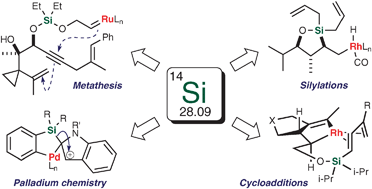Recent advances in the use of temporary silicon tethers in metal-mediated reactions
Abstract
This tutorial review describes the use of temporary

* Corresponding authors
a
Chemistry Research Laboratory, University of Oxford, 12 Mansfield Road, Oxford, UK
E-mail:
edward.anderson@chem.ox.ac.uk
Fax: +44 (0)1865 285002
Tel: +44 (0)1865 285000
This tutorial review describes the use of temporary

 Please wait while we load your content...
Something went wrong. Try again?
Please wait while we load your content...
Something went wrong. Try again?
S. Bracegirdle and E. A. Anderson, Chem. Soc. Rev., 2010, 39, 4114 DOI: 10.1039/C0CS00007H
To request permission to reproduce material from this article, please go to the Copyright Clearance Center request page.
If you are an author contributing to an RSC publication, you do not need to request permission provided correct acknowledgement is given.
If you are the author of this article, you do not need to request permission to reproduce figures and diagrams provided correct acknowledgement is given. If you want to reproduce the whole article in a third-party publication (excluding your thesis/dissertation for which permission is not required) please go to the Copyright Clearance Center request page.
Read more about how to correctly acknowledge RSC content.
 Fetching data from CrossRef.
Fetching data from CrossRef.
This may take some time to load.
Loading related content
